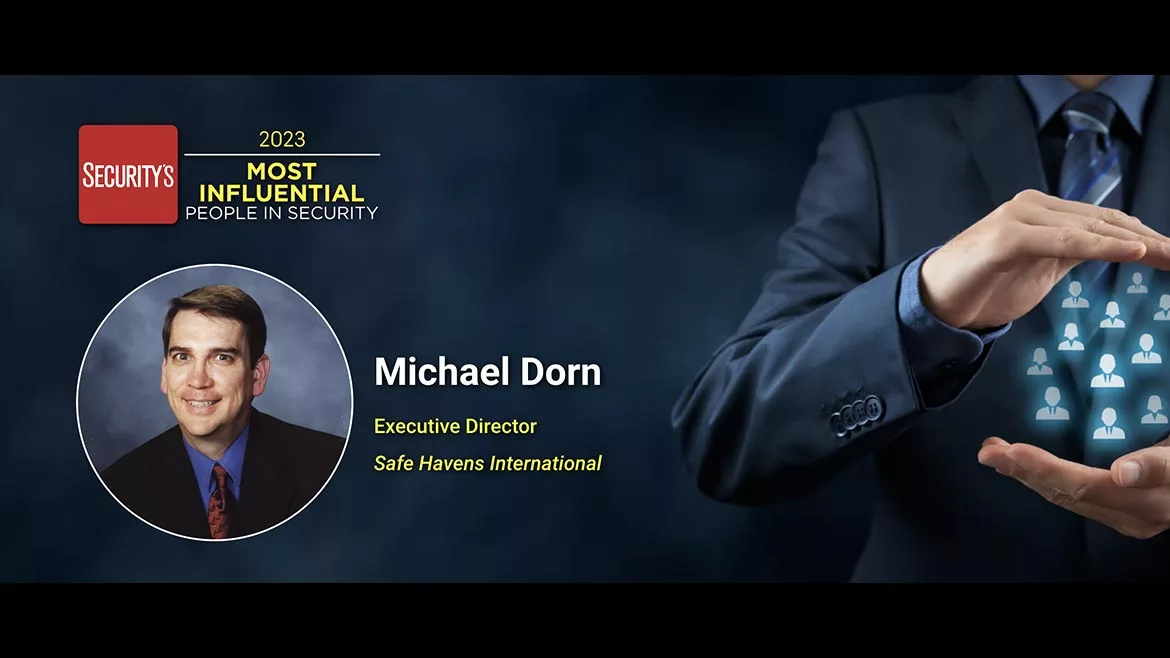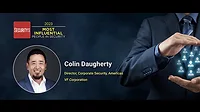Special Report
Michael Dorn | Most Influential People in Security 2023
Executive Director | Safe Havens International

Bio Image courtesy of Dorn
Background image courtesy of Jirsak / iStock / Getty Images Plus / via Getty Images
School safety is top priority
The path that led Michael Dorn to be one of the most highly credentialed and trusted school safety experts in the world is certainly a different one from most. Dorn’s passion for school safety is one born out of his own personal trauma and experiences as a student. He credits where he is today to two encounters: a teacher that recognized his dyslexia and pushed to get him the education he needed; and being arrested.
After a severe riot broke out at his middle school, Dorn and several other students were too scared to go back to school, and they were arrested for truancy.
“I was very fortunate to get arrested — I entered a juvenile court diversion program, which was the best thing that ever happened to me,” Dorn recalls. “Long story short, that put me on the right pathway to be able to become a police officer when I was 18. I wouldn’t want to go through it again but, that’s what still drives me to this day.”
After seeing a female student attacked, and himself being attacked several times, Dorn says he never felt as much fear in the 20 years he was a police officer as he did as a student in high school. The fear was so pervasive he even began carrying a .357 Magnum to school.
“I didn’t want to hurt anybody,” Dorn says. “But that experience of being in very dangerous schools and carrying a weapon has taught me a hell of a lot about why kids carry weapons to school and why they use them.”
It’s that experience that continues to motivate Dorn to improve safety for students, teachers and support staff.
“No kids should have to experience the kind of things that I went through,” he says. “And that’s really our nonprofit’s mission.”
Dorn has served as Executive Director of Safe Havens International since its inception in 2001. The organization is a nonprofit, K-12 school safety center committed to helping schools and school systems improve school safety, security, climate, culture and emergency preparedness.
Before entering the world of school safety, Dorn was sworn in as a Mercer University Police Officer at 18 years old, promoted to Corporal at 19, Sergeant at 21 and then Lieutenant at age 25. From there, Dorn served as Chief of Police at Bibb County Board of Education Campus Police Department for 10 years. During his time as Chief, the department developed what is believed to be the nation’s first multidisciplinary threat assessment team for a K-12 school system.
In 1999, Dorn served as School Safety Specialist for the Office of the Governor, Until 2003, he has also served as State Antiterrorism Planner for the Georgia Office of Homeland Security Terrorism Division, Lead Program Manager for the Georgia Office of Homeland Security Terrorism Division at the Georgia Emergency Management Agency, and a Senior Analyst for Public Safety and Emergency Management in Georgia.
“No kids should have to experience the kind of things that I went through, and that’s really our nonprofit’s mission.”
— Michael Dorn
During his more than 40-year campus safety career, Dorn’s work has taken him around the world, including Mexico, Honduras, Canada, Vietnam, the U.K., Kenya, South Africa, Israel and Mozambique. Dorn has coordinated school safety security, climate, culture and emergency preparedness assessments for more than 9,000 public, charter, faith-based, boarding and independent schools in a dozen countries. During this time, Dorn also has provided post-incident assistance for more than 300 school crisis events including assistance to law firms, school systems, state agencies and insurance carriers for 23 active shooter and targeted school shooting incidents in the United States, Canada and Mexico.
Learning from mistakes
Dorn says in order to be an effective leader, it is important to learn from your mistakes. One he still carries with him is the death by suicide of an officer while he was Chief of Police. The well-decorated officer had previously been named Georgia Female Law Enforcement Officer of the year.
“That was the worst day of my career and my biggest failure as a chief,” he recalls. “We lost an excellent police officer, I didn’t cause her death, but I failed to prevent it. I’ll never forget that terrible day we lost her and not a day passes that I don’t think of her.”
Dorn says that terrible event is one of the main reasons he is data-focused when it comes to risk assessments and implementing campus safety strategies.
“The way we view safety in this country, and overseas, is generally wildly inaccurate,” Dorn says. “People can get very focused on the anomalies that are so frightening, like terrorism, that get a lot of media coverage. But when you look at the fatality data, 8% of homicides are active shooter events and probably somewhere from a half to 1% of fatalities are active shooter events.”
Dorn says people are often unaware of the more common causes of death or injuries, such as a student being hit in the parking lot at the school, or e-cigarettes, because it rarely makes national news.
“That is one of our biggest battles, trying to get people to look at things from an all-hazards standpoint,” he says.
Importance of mentorship
Dorn learned a great deal from the multiple mentors he met along the way throughout his career, and he thinks it is important to mentor others in the security industry as well. Dorn emphasizes he’s learned just as much, if not more, from his employees over the years as he has from his superiors.
“It’s a two way street,” he says. “I may have been doing this longer, wrote more books, or whatever, but I’ve learned from every one of them. I think being a mentor is a good thing to do, and I think it makes you better at what you do as well.”
Dorn is always willing to answer questions or provide advice to other security professionals, even if they could become the “competition.”
“If I can help other people in the space get better that means a lot to me, because our philosophy is to help as many kids and faculty in as many schools as we can,” Dorn says. “Even if we were a for-profit business, I’d still do the same thing because t’s a responsibility. We’re in a field where we’re trying to prevent death, trauma and suffering.”
Looking for a reprint of this article?
From high-res PDFs to custom plaques, order your copy today!







